News & Events
A Look at Undergraduate Research: First Wives and Marriage in British Novels
This post is part of a series that profiles the faculty-undergraduate research partnerships offered through the Center for Interdisciplinary Teaching & Learning. To learn more, please contact the Center at citl@bu.edu.
A married woman abandons her husband and child to elope with a suitor who jilts her. A woman suffers hallucinations after she is suspected of burning her stepson to death. A mistress curses the young bride whose marriage will disinherit her son. Reading sensational nineteenth–century stories like these are all part of Kerry Sadlier’s work with Joellen Masters, senior lecturer of humanities at Boston University College of General Studies. With Sadlier’s invaluable help, Masters is studying marriage and the first wife as a narrative trope and genre strategy in the British and early modernist novel.
Sadlier (CGS’17, COM’19) became interested in participating in the CGS Undergraduate Research Experience when Associate Dean Megan Sullivan mentioned the program in a meeting: “I decided to pursue it when I realized how much I enjoyed the research aspect of my RH102 research paper.” Funded by the Center for Interdisciplinary Teaching & Learning, the CGS Undergraduate Research Experience gives CGS students a stipend for their research work with a CGS faculty member. When she learned about Masters’ research focus, Sadlier said it “seemed like a perfect fit for me” given her own interest in Victorian literature and women’s rights.
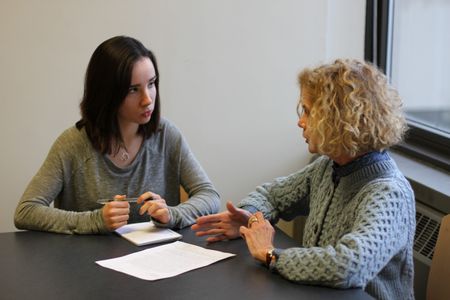 As a research assistant, Sadler hunts for scholarly articles, essays, and contemporary reviews of the novels Masters is studying. Sadlier and Masters meet each week to review the materials and, as Masters puts it, “set up her next foray into the stacks and the databases.” Sadlier also gives comprehensive annotations for many of the critical works important for Master’s research.
As a research assistant, Sadler hunts for scholarly articles, essays, and contemporary reviews of the novels Masters is studying. Sadlier and Masters meet each week to review the materials and, as Masters puts it, “set up her next foray into the stacks and the databases.” Sadlier also gives comprehensive annotations for many of the critical works important for Master’s research.
Before the fall semester began, Sadlier was jumping into the Victorian era by reading Ellen Wood’s East Lynne (a wildly popular novel published in 1861) and St. Martin’s Eve (1866), and George Eliot’s Daniel Deronda (1876). Sadlier found some excellent information to help Masters expand on a draft about East Lynne. “She found articles and books that were fabulous, particularly those on Daniel Deronda and Lydia Glasher’s key place in Eliot’s plotting as well as story,” Masters said. Sadlier also tracked down unpublished dissertations and articles that have helped Masters learn more about Netta Syrett, a little-discussed playwright, novelist, and children’s story writer who was part of a high profile fin-de-siecle literary and artistic circle.
“This experience has been incredibly exciting and challenging,” says Sadlier. “The most exciting part of this job is the opportunity to discover new information about an author or character and contribute to telling their story.” Masters says Sadlier has tackled the research with an “enthusiasm, diligence, and commitment that stimulated my own energies with the project.”
Learn more about student research opportunities—including directed study, stipends for research work through the Center for Interdisciplinary Teaching & Learning, and the Undergraduate Research Opportunities Program. Contact CITL at citl@bu.edu for more details.
Megan Sullivan Completes Leadership Training at 2016 HERS Denver Summer Institute
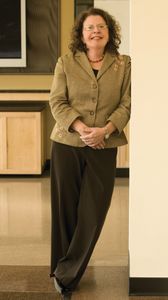 Megan Sullivan, associate dean for faculty research and development and director of the Center for Interdisciplinary Teaching and Learning, joined other leaders in higher education for the 2016 Higher Education Resource Services Denver Summer Institute. Along with 62 women leaders from across the United States, Sullivan completed the intensive, 12-day leadership development curriculum that HERS offers to help participants "gain the knowledge and skills needed to lead change on their campus and positively affect higher education."
Megan Sullivan, associate dean for faculty research and development and director of the Center for Interdisciplinary Teaching and Learning, joined other leaders in higher education for the 2016 Higher Education Resource Services Denver Summer Institute. Along with 62 women leaders from across the United States, Sullivan completed the intensive, 12-day leadership development curriculum that HERS offers to help participants "gain the knowledge and skills needed to lead change on their campus and positively affect higher education."
HERS "is dedicated to creating and sustaining a community of women leaders through leadership development programs and other strategies with a special focus on gender equity within the broader commitment to achieving equality and excellence in higher education." Its three Institutes have provided leadership and management development to approximately 5000 women faculty and staff members from 1200 campuses.
Sullivan participated in institute sessions such as Managing and Leading Change: Your Role in Re-inventing Higher Education, New Partnerships & New Pathways, Leaning into Turbulent Times, Exploring Inclusive Excellence and Reframing: Work-Life to Living Well. Faculty and guest speakers included: Betty Stewart, provost and vice president for academic affairs, Midwestern State University; Soraya Coley, president, Cal Poly Pomona; and Tuajuanda Jordan, president, St. Mary’s College of Maryland. Sullivan also worked on a project that she plans to further develop at BU -- a website that would help faculty better understand how to help students with disabilities.
“The faculty at HERS, our guest speakers, and the other participants all taught me so much about what women can do as faculty and administrators in higher education. The experience was truly invaluable,” said Sullivan.
Sullivan has been serving as associate dean since 2013. She was previously associate professor of rhetoric at Boston University’s College of General Studies. Her recent achievements include securing grants for faculty development and co-editing her most recent book: Parental Incarceration: Personal Accounts and Developmental Impact (Routledge 2016). Her participation in the HERS Denver Institute was sponsored by The Office of the Provost and The College of General Studies.
CITL Summer Institute To Explore 1960s Politics and Pop Culture
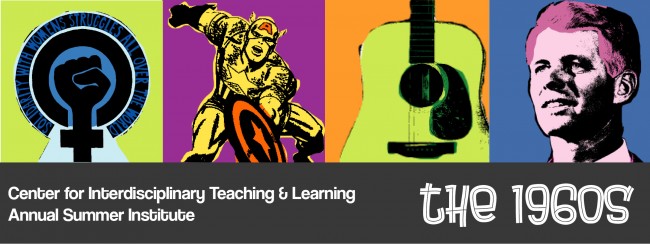 On July 16, Boston University College of General Studies will host a day of interdisciplinary learning exploring the politics, protests, progressivists and publications of a decade of radical social change—the 1960s.
On July 16, Boston University College of General Studies will host a day of interdisciplinary learning exploring the politics, protests, progressivists and publications of a decade of radical social change—the 1960s.
The event is hosted by the Center for Interdisciplinary Teaching & Learning and is the fourth Annual Summer Institute hosted by CITL. Each year, the institute highlights interdisciplinary and experiential learning—two hallmarks of the CGS teaching model. CITL Summer Institute: The 1960s will treat attendees to four interactive talks, breakfast and lunch, and a reception with the rock music of the 1960s.
Megan Sullivan, CGS associate dean for faculty research and development and director of CITL, said the theme for this year’s event emerged from the unique interests and expertise of CGS faculty. Thomas Whalen, associate professor of social sciences, will bring his study of presidential politics to the topic “Bobby, the Gipper, and Tricky Dick: The 1968 Presidential Election and Transformation of American Politics.” Lynn O’Brien Hallstein, associate professor of rhetoric, will speak on “Male Bashers, Mother Haters, and Bra Burners: The Myths and Truths of the Women’s Movement.” Lecturer Charles Henebry studies comic books and other graphic narratives and will be speaking on “Sick Humor and Upright Morals: Squeaky Clean to Counter-Cultural Comics.” Senior lecturer Cheryl Boots, whose study of civil rights era songs was recently highlighted by BU Research, will discuss “Attack Dogs and Firehoses: Local News Coverage and Protest Music.”
Sullivan says the annual institute allows CGS to practice what it preaches: “We teach students that in order to examine real world issues such as politics and civil rights, they have to use the ways they have learned to think in all the disciplines.” Studying an era like the 1960s involves looking at culture broadly—digging not just into history but also looking at pop culture, Sullivan says: “The institutes provide us an opportunity to show others how this focus on interdisciplinary thinking works.”
Most of the institutes have featured music, and this year is no exception. “We'll cap our day with a reception and two musicians who will sing music of the sixties all while educating us about Boston's contributions to the national music scene,” Sullivan says. BU alumnus John Broderick (ENG’70, ENG’77) and Nick Racheotes, board members of the Brighton-Allston Historical Society, will play music and show the Boston venues of the 1960s vibrant rock scene. Sullivan says, “My guess is that before the end of this final reception we'll all be singing along!”
Register for the CITL Summer Institute to join CGS for this event and contact citl@bu.edu with questions.
The Impact of Parental Incarceration: Dean Sullivan Releases New Book
1.7 million children currently have parents in the United States prison system. 30% of them will follow in their parents’ footsteps.
Those are the astounding statistics that are discussed at length in Associate Dean Megan Sullivan’s new book, Parental Incarceration: Personal Accounts and Developmental Impact. The book, which is now available on Amazon and Routledge.com, examines the various perspective of adults who experienced parental incarceration during childhood and analyzes the impact of the experience on health, development and the risk for intergenerational crime and incarceration.

We asked Dean Sullivan to reflect on her experience of writing Parental Incarceration.
CGS: What kind of conversation do you hope this book will spark?
Sullivan: I hope this book sparks a wide and diverse dialogue about incarceration. Particularly its effects on children and families. For the most part, there are only certain people who tend to discuss incarceration – people who work in corrections, scholars and policy analysts, and incarcerated people and those who love them. I would love to see others get involved in the discussion.
Imagine if students and neighbors and policy makers and families of incarcerated men and women could come together to discuss what they knew about prisons and criminal justice. Or, better yet, what they don’t know. I think that kind of dialogue would not only be instructive, but also might take away the stigma that surrounds incarceration.
CGS: What major trends in incarceration were you able to discuss in this book?
Sullivan: Due to “three strikes” policies, minimum sentencing guidelines, and the “war on drugs” more who are involved in non-violent crimes are being locked up for longer periods of time. This means more families and communities are affected and for longer periods of time.
It also means that there has been an explosion of parents who have been incarcerated. Between 1991 and midyear 2007, parents held in state and federal prisons increased by 79% .The most rapid growth in the number of parents held in the nation’s prisons and their children occurred between 1991 and 1997. Currently, the majority of incarcerated persons are parents, and the number of minor children with an incarcerated parent has concurrently increased, peaking at an estimated 2.9 million in 2006.
The second trend we talk about is that for children, parental incarceration is not a monolithic experience. There are so many variables in families that determine how a parent’s incarceration will affect a child. For instance, did the child live with the parent before he or she was incarcerated? Was the child receiving financial support from the incarcerated parent? The parent’s gender has a large impact on how the child will be impacted, as does the child’s support network. All these variables mean we have to think carefully about how children and families are actually impacted before we suggest programs that can help them.
CGS: Since you and your co-author came from different professional backgrounds, what kind of interdisciplinary approach did you take when writing together?
Sullivan: We tend to talk about the benefits of interdisciplinary research but not the difficulty of it. Truly interdisciplinary collaboration is great and hard. My colleague has an M.D. and is much more data driven than I am, so she sometimes wanted to make definitive statements that were supported by statistics but that didn’t seem to me to represent the reality of how some people lived and felt. As a Humanities scholar I was always parsing out the data and saying “but wait a minute here we have writing by one of our contributors who says he feels this way or he experienced this event. How does that complicate the data?”
Here at the College of General Studies and the Center for Interdisciplinary Learning we try to convey to students that truly interdisciplinary work is informed by what we know and how we think across the disciplines. It’s not just that, in the case of this book, you have two scholars from different fields writing a book together. It’s bigger: it’s that you have two scholars who are bringing what they know and how they think to a problem that affects real people and communities.
Parental Incarceration: Personal Accounts and Developmental Impact is available for purchase at Routledge.com and Amazon.
A Look at Undergraduate Research: Climate Change and Law

This post is part of a series that profiles the faculty-undergraduate research partnerships offered through the Center for Interdisciplinary Teaching & Learning. To learn more, please contact the Center at citl@bu.edu.
This past November, representatives from 195 countries came together for the 2015 United Nations Climate Change conference in effort to create a binding and universal agreement on climate from all the nations of the world. While the environment has been a long-time concern for many, it has increasingly gained momentum as carbon emissions ever-increase and more countries recognize and take ownership for their policies and actions.
As the conversation about environmental protection intensifies, Humanities professor R. Samuel Deese and junior Isabel Keogh (CGS 15, SHA 17) are eagerly researching the life and work of maritime law and environmental protection expert Elisabeth Mann Borgese. As the youngest daughter of the German author and anti-facist Thomas Mann, Elisabeth became concerned with global law and a specific interest in ocean conservation. During the United Nations Convention on the Law of the Sea from 1973-1982, she served on an expert group that helped define the rights and responsibilities of nations with respect to their use of the world's oceans, establishing guidelines for businesses, the environment, and the management of marine natural resources. "As the international community struggles to find common ground on environmental issues, her writings on the Law of the Sea will take on great relevance," shares Deese.
Having grown up in a German-speaking household, Isabel worked with another CGS professor during her sophomore year in a similar manner. Keogh is helping translate the text of the only biography about Borgese, including making an index of key terms and people. After distilling insights, Keogh and Deese meet to discuss. "Translating for Professor Deese has helped me further improve my German; I am diversifying my vocabulary while learning about German literature and history," Koegh shares. "It's a great added dimension to my classroom education, as I'm a student in the School of Hospitality."
Deese plans to present findings in a paper at the World History Association's 24th Annual Conference in Ghent, Belgium, and include the research in his forthcoming book, Our Spherical Oasis: Climate Change, Democracy and the Global Commons (Springer Verlag. 2017). Keogh plans to pursue a career in event planning, and looks forward to using German when she can.
A Look at Undergraduate Research: Victorian Feminism
This post is part of a series that profiles the faculty-undergraduate research partnerships offered through the Center for Interdisciplinary Teaching & Learning. To learn more, please contact the Center at citl@bu.edu.

Parallel to the United States, twentieth century Great Britain was marked with a series of women's rights victories. But what preceding efforts, championed by those in the nineteenth century, set the stage for success in Britain? CGS professor of rhetoric Beth Kramer is studying how the trends and concerns of Victorian feminism-- including what many take for granted today such as married women's property rights, employment rights, and educational opportunities-- influenced modern feminism. This year, Kramer has had the support and partnership of undergraduate research assistant and former student Jessica Rizk (CGS 15, COM 17); the partnership was made possible by the Center for Interdisciplinary Teaching & Learning.
Specifically Rizk is helping analyze the writing and letters of Virginia Woolf. "With the guidance of Professor Kramer, I analyze Woolf's letters to better understand the struggle Woolf faced in balancing her professional and domestic roles," she explains. "I find a lot of enjoyment in the work-- peeking into the life of such an admirable writer-- and being able to better understand how the feminist views of her time sneak their way into her daily activities and conversations."
This research offers a degree of flexibility and independence, and is underpinned with partnership and collaboration. Often, the duo conducts work independently and comes together to review findings and discuss what that might mean for research moving forward. "So far, we have discovered that Woolf's letters reveal a very intense engagement with many of the same concerns as her feminist predecessors. A prominent theme is the continual struggle to recognize her professional, public goals with more personal, domestic concerns," reports Kramer. "Along those same lines, we are looking into how her letters foreshadow twenty-first century feminist concerns around balance in women's lives." This continues to remain a trending topic today.
When asked why she decided to pursue an undergraduate research opportunity, Rizk shared, "A liberal arts education complemented my studies outside of CGS in many ways. Particularly, it strengthened my analytical and communication skills. I knew I wanted to pursue truly balanced education while majoring in economics and communication... this project has enriched my academic experience by teaching me how to quickly synthesize information, organize my findings, and communicate their significance. This has not only helped me study more efficiently, but is also a skill that easily translates into any research I conduct in class." Rizk looks forward to applying such skills as she begins researching for her thesis in economics.
Deans McKnight and Sullivan to Present at Interdisciplinary Studies Conference
Dean Natalie McKnight and Associate Dean Megan Sullivan will be speaking at the 37th Annual Meeting of the Association for Interdisciplinary Studies. Committed to promoting conversation among scholars and administrators in the arts and sciences on issues concerning integrative studies, the Association has strong synergies with the work of the Center for Interdisciplinary Teaching & Learning at the College of General Studies.
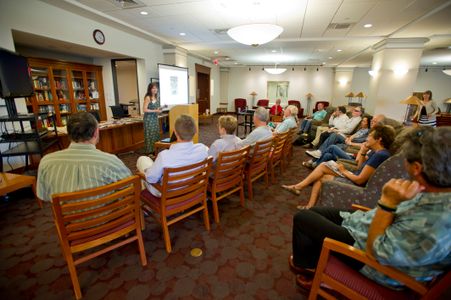
The conference, Impact for the Common Good?, will take place at Merrimack College in North Andover, Mass., from October 22 to October 25. Academy members, practitioners, and community members will exchange ideas about how interdisciplinary studies can advance and expand the notion of the “Common Good.” It will also provide a forum to discuss how colleges and community groups can collaborate on new models for change.
McKnight and Sullivan will present on “The Ethics and Impact of Interdisciplinarity: Diverse Perspectives for the Common Good.” Discussing insights from the Capstone projects and Rhetoric research assignments—key components of the CGS student experience— McKnight and Sullivan will share how such assignments encourage students to look at issues from various perspectives in order to create a greater good for themselves, their studies, and their world.
For more information on Impact for the Common Good?, see here. For more on the Association for Interdisciplinary Studies, see here.
CITL Annual Conference Explores Impact of Technological Trends From Scientific and Humanities angles
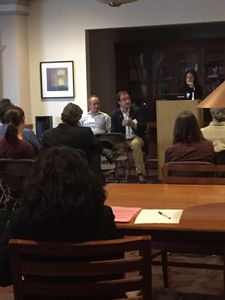
The Center for Interdisciplinary Teaching & Learning (CITL) recently held its annual interdisciplinary conference, this year bringing together experts from science and from the humanities to discuss the anthropocene, a proposed epoch that begins when human activities started to have a significant global impact on the planet's ecosystems.
While technology has introduced countless conveniences, efficiencies, and modern-day miracles that shape our every day lives, it also brings with it a set of growing serious societal and ethical concerns. Experts from The Future Society at Harvard Kennedy School, the Future of Life Institute, Boston University, the University of Wisconsin-Madison, and more, gathered for a series of lectures and discussions to better understand how ecological and technological trends are influencing the planet and humanity. Reporter Elizabeth Preston provides more color around the conversations and concerns raised in her recent Boston Globe article.
Conference organizer R. Sam Deese reflects, "By defying the traditional barriers between the sciences and humanities, our conference brought together leading researchers on a wide array of urgent and emerging issues, from climate change to Artificial Intelligence. These issues are incredibly complex, but the idea behind the conference was simple: people from across the disciplines must communicate now more than ever. In sponsoring events like this, the Center for Interdisciplinary Teaching & Learning can contribute to that process." College of General Studies faculty members Joelle Renstrom, and Charles Henebry were also organizers.
For more information on the conference, see here.